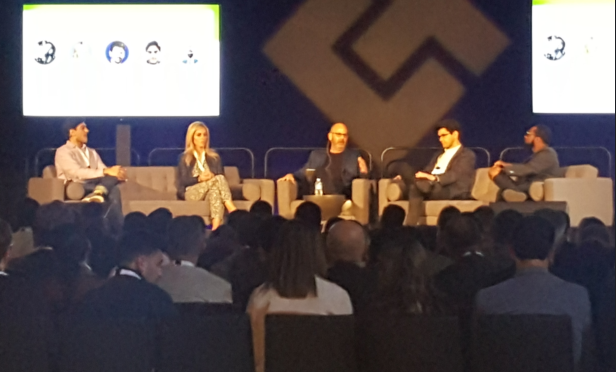 WeWork is growing rapidly, and while they are relatively new to the market, they are taking a long-term view of the office industry. At the annual CRETech conference in Los Angeles yesterday, WeWork leaders opened the event with a look inside the company's business model and perspective, including its growth, the future of office and how WeWork is impacting the office market. Panelists included Sarah Pontius, SVP and global head of real estate partnerships; Granit Gjonbalaj chief real estate development officer; Rohit Dave, senior director of mergers and acquisitions; Craig Robinson, global head of powered by We Services. Michael Beckerman, CEO of CRETech, moderated the panel.
WeWork is growing rapidly, and while they are relatively new to the market, they are taking a long-term view of the office industry. At the annual CRETech conference in Los Angeles yesterday, WeWork leaders opened the event with a look inside the company's business model and perspective, including its growth, the future of office and how WeWork is impacting the office market. Panelists included Sarah Pontius, SVP and global head of real estate partnerships; Granit Gjonbalaj chief real estate development officer; Rohit Dave, senior director of mergers and acquisitions; Craig Robinson, global head of powered by We Services. Michael Beckerman, CEO of CRETech, moderated the panel.
The firm launched as an office services company first and expanded into a real estate company as it grew, but today, it still focuses on its core mission: to create energy where people work and spend the majority of their time, according to Robinson. As a result, the firm is always looking for ways to add value to customers and is focused on the future: what will office look like in 10 years; what will employment look like in 10 years. In the same vein, WeWork is asking where it wants to be as a company in 10 to 15 years, and how to position itself today to achieve that growth. In many ways, it is similar to any other real estate investment company. In fact, Pontius, who joined the company three months ago and formerly worked at Brookfield, drew comparisons between the growth strategies of the two companies. “People say we are growing fast. I have had the time to get under the hood and there is a lot of diligence happening. This is a long-term play and we are long term players,” she said on the panel.
The majority of WeWork's growth has come in the last two to three years, and today it is working with several fortune 500 companies and 35% of members are large companies. “The intent is different,” said Robinson, who reminded the audience that WeWork's ultimate mission is to elevate the world's consciousness. “60% of people are looking for a job. If you are unfulfilled, you are not going to be a high performing worker,” he added.
In that time, the company has evolved to incorporate more technology and partner with landlords, companies and even employees to curate a unique workplace experience. In many ways, according to the panelists, the company has a lot of data that can impact the decisions of landlords and internal workplace strategies. Technology has helped scale the platform. Today, WeWork has 1,500 to 2,000 software engineers. “We are always thinking about replacing manual processes through tech. Tech is part of the business solution. [Our software engineers] are solving problems and working with the team to create that solution,” Gjonbalaj said. Robinson adds that WeWork is helping accelerate the adoption of technology in real estate by investing in new and emerging technologies. “If we could be a big enough customer, we could take a good idea and bring it to scale,” he said on the panel. “There are always good ideas that never get to scale. We need to find ways to get innovation better distributed and more quickly.”
So, the three pillars of the company have become landlords, tenants and technology, and working simultaneously with those three groups and bridging them has helped to drive disruption in office. “We are not only leasing space but working alongside large companies to make change in this industry,” said Pontius. “At WeWork, we have so much data because we are working with both sides. “That is how we are moving this industry forward and catch up with other industries that have been using tech.”
Looking ahead, the firm is focused on developing those partnerships to grow memberships and its physical footprint. “Now, we want to be strategic, and we need physical space to grow our community,” said Gjonbalaj. “We are adding a lot of value.” Robinson added, “We are changing the conversation. We are having a conversation about the human experience. That is creating opportunities for everyone.”
© Touchpoint Markets, All Rights Reserved. Request academic re-use from www.copyright.com. All other uses, submit a request to [email protected]. For more inforrmation visit Asset & Logo Licensing.






